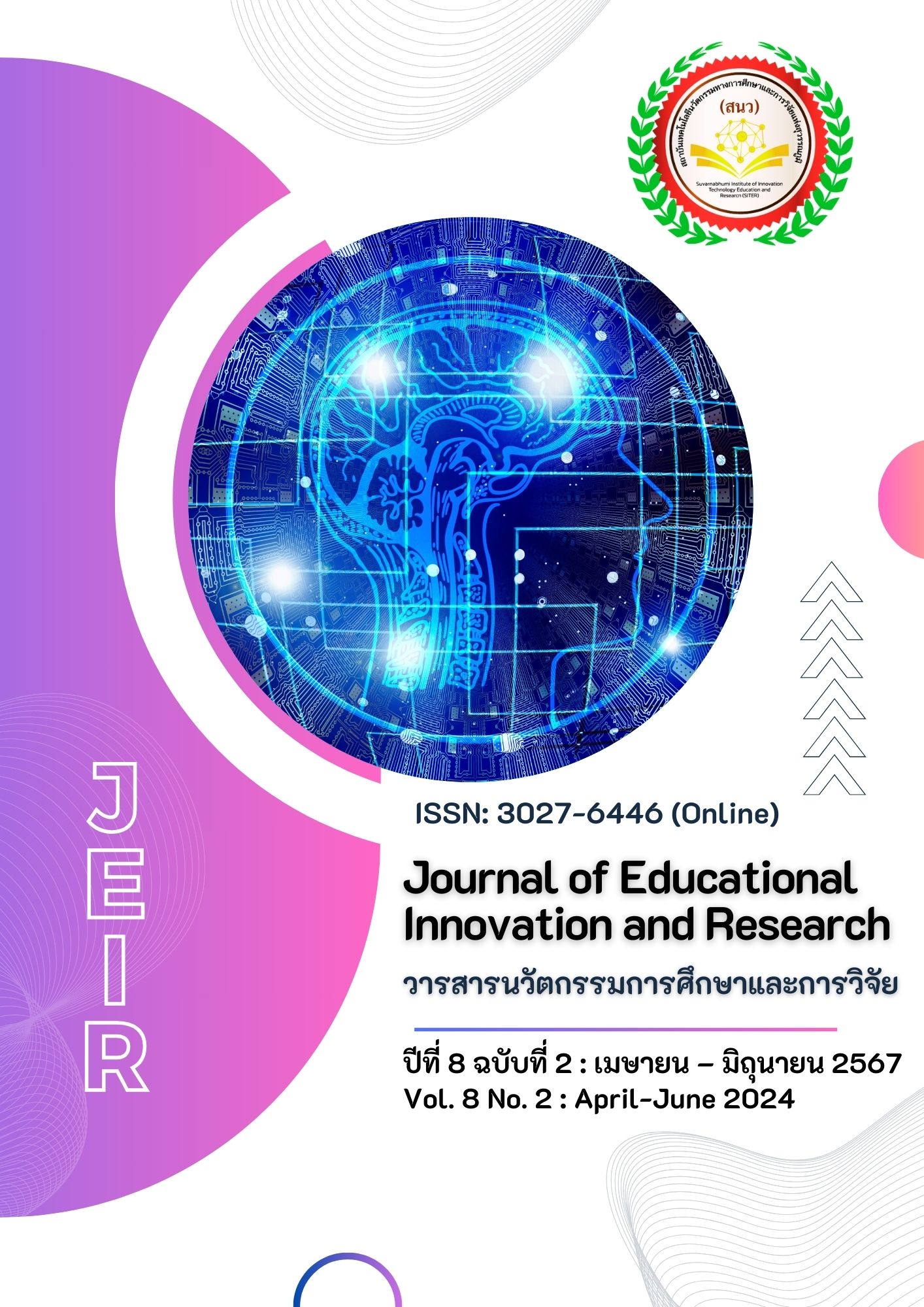การศึกษาผลการให้คำปรึกษากลุ่มเพื่อเสริมสร้างการตระหนักรู้ทางอารมณ์ของนักศึกษาวิชาชีพครู
Main Article Content
บทคัดย่อ
การวิจัยในครั้งนี้มีวัตถุประสงค์เพื่อ 1) สร้างรูปแบบการให้คำปรึกษากลุ่มเพื่อเสริมสร้างการตระหนักรู้ทางอารมณ์ของนักศึกษาวิชาชีพครู 2) เปรียบเทียบการตระหนักรู้ทางอารมณ์ของนักศึกษาวิชาชีพครูที่เข้าร่วมการให้คำปรึกษากลุ่มในระยะก่อนทดลอง หลังทดลอง และติดตามผล กลุ่มตัวอย่างที่ใช้ในการวิจัย คือนักศึกษาวิชาชีพครูมหาวิทยาลัยราชภัฏในจังหวัดภาคตะวันออกเฉียงเหนือตอนล่างจำนวน 460 คนและนักศึกษาวิชาชีพครูที่มีค่าเฉลี่ยการตระหนักรู้ทางอารมณ์ต่ำกว่าเปอร์เซนไทล์ที่ 25 ลงมา จำนวน 8 คน เครื่องมือที่ใช้ในการวิจัยได้แก่ 1) แบบวัดการตระหนักรู้ทางอารมณ์ที่มีค่าความเชื่อมั่นเท่ากับ 0.91 2) รูปแบบการให้คำปรึกษากลุ่มเพื่อเสริมสร้างการตระหนักรู้ทางอารมณ์ วิเคราะห์ข้อมูลโดยการหาค่าเฉลี่ย ส่วนเบี่ยงเบนมาตรฐาน และวิเคราะห์ความแปรปรวนพหุคูณทางเดียวแบบวัดซ้ำ
ผลการวิจัยสรุปได้ดังนี้ 1) รูปแบบการให้คำปรึกษากลุ่มจำนวน 10 ครั้ง ครั้งที่ 1 การสร้างสัมพันธภาพ ครั้งที่ 2 การมีสติรับรู้ทางด้านร่างกาย ครั้งที่ 3 การระบุอารมณ์ความรู้สึก ครั้งที่ 4-5 การวิเคราะห์อารมณ์ความรู้สึก ครั้งที่ 6-7 การตระหนักในอารมณ์ของตนเองและผู้อื่น ครั้งที่ 8-9 การแสดงออกทางอารมณ์ ครั้งที่ 10 การยุติการให้คำปรึกษา 2) นักศึกษาวิชาชีพครูที่เข้าร่วมการให้คำปรึกษากลุ่มในระยะหลังทดลองและระยะติดตามผลมีการตระหนักรู้ทางอารมณ์สูงกว่าระยะก่อนทดลองอย่างมีนัยสำคัญทางสถิติที่ระดับ .05 กระบวนการให้คำปรึกษากลุ่มที่มีการบูรณาการเทคนิค การให้คำปรึกษากลุ่มที่มีประสิทธิภาพส่งผลให้นักศึกษาเกิดประสบการณ์เรียนรู้ในด้านความคิด ความรู้สึกและพฤติกรรมทำให้เกิดการตระหนักรู้ทางอารมณ์ที่สูงขึ้น
Article Details

อนุญาตภายใต้เงื่อนไข Creative Commons Attribution-NonCommercial-NoDerivatives 4.0 International License.
เอกสารอ้างอิง
Announcement of the Ministry of Education on Qualification Standards of Bachelor's degree of Education Program, Thai government gazette (NO.136), Special Section 56D (6 March 2019): 12.
Agnoli, S., Giacomo, M. & Elena, T. (2019). The relationship between trait emotional intelligence, cognition, and emotional awareness: An interpretative model. Frontiers in Psychology, 10,1711.
Arguedas, M. Daradoumis, T. & Xhafa, F. (2016). Anlyzing How Emotion Awareness Influence Students” Motivation, Engagement, Self Regulation and Learning Outcome. Educational Technology& Society,19(20), 87-103.
Barett, L. F. (2017). The theory of constructed emotion. An active inference account of interception and categorization. Social Cognitive and affective Neuroscience, Crossref PubMd, 12,1-23.
Corey, G. (2022). Theory and practice of group counseling. (10th ed.). Belmont, CA: Brooks/Cole Thomson learning.
Erden, S. (2015). Awareness: The effect of group counseling on awareness and acceptance of self and others. Procedia - Social and Behavioral Sciences, 174,1465 – 1473.
Gelso, C. J., Nutt Williams, E., & Fretz, B. R. (2014). Counseling psychology (3rd ed.). American Psychological Association. https://doi.org/10.1037/14378-000
Jacobs, E. E., Masson, R. L. & Harvill, R. L. (2015). Group counseling strategies & Skills. (9th ed.). Belmont, CA: Thomson Brooks/cole.
Klein, R. H. (2008). Toward the establishment of evidence – based practices in group psychotherapy. International Journal of group psychotherapy, 58(4), 441-454.
Lane, R. & Smith, R. (2021). Level of Emotional Awareness: Theory and Measurement of a Socio-Emotional Skill. Journal of Intelligence, 9(42), 1-35.
Norcross, C .J. (2005). Handbook of Psychotherapy Integration. (2nd ed.). New York: Oxford University Press.
Office of the Higher Education Commission. (2021). Undergraduate student statistics. www.mua.go.th/ohec/
Ritkumrop, K., Surakarn, A., & Ekpanyaskul, C. (2022). The effectiveness of an integrated counseling program on emotional regulation among undergraduate students with depression. Journal of Health Research, 36(3), 186-198.
Sendzik, L.,Schafer J. O., Samson, A. C., Naumann, E., & Tuschen-Caffer, B. (2017). Emotional Awareness in depressive and Anxiety Symptoms in Youth: A Meta-Analytic Review. J Youth Adolescence. Springer Science, 46,687-700.
Shulman, L. (2011). Dynamics and skills of group counseling. University at Buffalo (SUNY) Brooks/ Cole, Cengage Learning.
Smith, R. Persich, M. Lane, R. D. & William, D.K. (2021). Higher emotional awareness is associated with greater.domain-general reflective tendencies. Scientific Reports. https://doi.org/10.1038 /s41598-022-07141-3
Sukhapirom, A. Chaiwimol, R. & Sutthitatip, S. (2019).The Effect of Cognitive-based Theory Group Counseling towards the Emotional Competence of Freshmen Undergraduate Students Muban- Chombueng Rajabhat University. Research Journal (Humanities and Social Sciences), 7(2),178-195.
Thomas, T. (2012). Enhancing Psychodrama Through the Use of Cognitive Behavioral Therapy Techniques. Journal of Group Psychotherapy Psychodrama Sociometry, 55(2-3), 55-56.
Thomson, R.A. (2016). Counseling techniques: Improving relationships with others, ourselves, our families and our environment (3rd ed.).New York: Routledge.
Weissman, G . D. Nook, E.C. Dews, A. A. Miller, A. Lambert, H.K. Sasse. S.F. Somerville, L.H. & McLaughlin, K.A. (2020). Low Emotional Awareness Transdiagnostic Mechanism Underlying Psychopathology in Adolescence. Sage journals, 8(6), 971-988.


